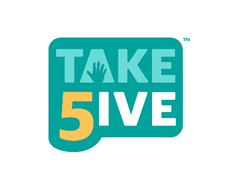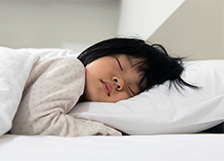In this section
Community partners and professionals
- Child abuse prevention
- Child Advocacy and Protection Services (CAPS)
- Child Welfare Services
- Memberships and accreditation
- Child well-being: Strong Families, Thriving Children
- Resources for schools
- Nutrition ages 2 to 4
- Nutrition ages 5 to 12
- Nutrition 13 and up
- Physical activity ages 2 to 4
- Physical activity ages 5 to 12
- Physical activity 13 and up
- Healthy minds ages 2 to 4
- Healthy minds ages 5 to 12
- Healthy minds 13 and up
Healthy minds-ages 2 to 4
Use these activities to help your family learn to practice mindfulness, learn about the importance of sleep and the impact of screen time.
Mindfulness
Mindfulness videos
- The mindful jar activity (En Español) can help teach children about how strong emotions can take hold, and how to find peace when these strong emotions come up.
- Using a Hoberman sphere (En Español), or breathing ball, can help teach kids mindful breathing.
Take 5ive videos
 These videos offer three types of guided exercises designed to develop focus and attention skills, cultivate everyday kindness strategies, compassion and gratitude and reset and attune the mind-body connection through movement.
These videos offer three types of guided exercises designed to develop focus and attention skills, cultivate everyday kindness strategies, compassion and gratitude and reset and attune the mind-body connection through movement.
The videos feature calming natures scenes with voiced instructions throughout the practice or animations that are movement based.
Toddlers and preschoolers may not yet have the attention spans needed to make it through an entire video, but focus and attention are skills they can practice and build over time.
How can mindfulness help kids
Mindfulness is a research-based tool that starts with purposefully bringing focus to thoughts, emotions, physical feelings, and environment. It allows kids to learn how to pause, which can be very beneficial for them both in school and at home.
Using mindfulness can help with increasing self-awareness, self-regulation, and impulse control. Improved focus and attention, decreased stress and anxiety, increased feelings of kindness and increased ability to manage emotions are common results of mindfulness practice in both kids and adults.
Mindfulness activities are more beneficial for kids when modeled by adults at home, so it's important to try and practice mindfulness yourself.
Sleep
How to help kids get enough sleep

Try to have them go to bed at the same time every night as this helps them get into a routine. Follow a calming routine each night which may include taking a warm bath or reading a book.
Avoid foods and drinks near bedtime. Try to find a routine to help them wind down when bedtime or naptime are approaching. However, exercise earlier in the day does help a person sleep better.
Use beds or cribs just for sleeping. This will help train their bodies to associate them with sleep.
Toddlers and sleep
1 to 2 year olds usually need between 12 to 14 hours of sleep each day, including naps. It's also recommended that your 1 to 2 year old sleep in a safe, secure crib, but try to avoid any large soft toys or stuffed animals, along with anything with strings or ties in or around the crib.
Preschoolers and sleep
Every child is different and they all need different amounts of sleep, but preschoolers on average need between 11 and 12 hours of sleep each day.
- Most preschoolers still need naps during the day and a 1 hour nap is usually enough.
- Consistency is key for both nap time and bedtime.
Visit this Kids Health website for some additional tips for getting your preschooler enough sleep.
Screen time
What is screen time?
 Screen time includes watching TV, using a cell phone or tablet, working on a computer, or playing video games. Because screen time is a sedentary activity, it can have a negative impact on overall health.
Screen time includes watching TV, using a cell phone or tablet, working on a computer, or playing video games. Because screen time is a sedentary activity, it can have a negative impact on overall health. On average, kids under 6 watch about 2 hours of TV, videos and movies per day.
Screen time guidelines
Reducing screen time
Parents and adults can model good behavior by reading books or getting outside to be active instead of watching TV. Encouraging healthy behaviors and limiting unhealthy ones will help kids build healthy habits.
- Set boundaries and times that kids can have screen time and try finding other activities for children, such as board games, arts and crafts or sports to take the place of screen time.
- Be on the lookout for behavioral changes. Kids can become irritable, aggressive, selfish, or impatient after too much screen time.
- Cut down on having screens during mealtimes and car rides. About 64% of people have their TV on during mealtimes so try turning off the TV and talk to your kids about their day.
- Avoid putting TVs in bedrooms. This will reduce screen time and can help improve the quality of sleep that kids, and their parents, get!
Check out this fact sheet for some tips to use at home. | En Español
Healthy minds resources
Mindfulness resources
- The mindful jar activity can help teach children about how strong emotions can take hold, and how to find peace when these strong emotions come up. | En Español
- Using a Hoberman sphere, or breathing ball, can help teach kids mindful breathing. | En Español
Screen time resources
- This media plan website can help your family create a plan to limit screen time and track screen use.
- This article from Healthy Children provides some good information about screen time and its impact on brain development.
Sleep resources
- Learn all about sleep!
- Learn more about toddlers and sleep.
